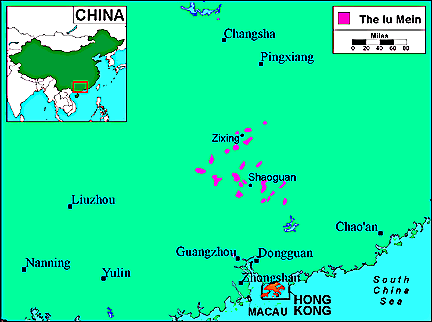|
|
Prayer Profile
The Iu Mein of China
![[IMAGE]](../images3/0569.jpg)
The Iu Mien live scattered throughout the mountains of southern China, primarily in the Guangxi, Guangdong and Hunan provinces. They speak a Sino-Tibetan language that is also called Iu Mien. Their writing system was formerly based on Chinese characters; however, a Roman-based script was devised in 1983.
China is the original homeland of the Iu Mien, although many have migrated south due to pressure from the Chinese. Those who remained in China were gradually reduced in number and forced into the hills, possibly by migrating Chinese who took over the more fertile areas.
During the Chinese Cultural Revolution, (1965-1976), more than 60 million urban people were sent to the countryside to settle borderlands for economic reasons. Today, Chinese merchants frequently visit the Iu Mien villages. Their values and customs are highly influenced by the surrounding Chinese.
What are their lives like?
The Iu Mien are known as "mountain dwellers." Occupying land up to heights of 12,000 feet, they have ingeniously adapted to their landscapes by carefully constructing terraced rice-paddies on the sides of steep cliffs. Formerly, the Iu Mien farmers used the "slash and burn" method of cultivation. Unfortunately, this destroyed many of the tropical evergreen forests that once covered the lush hillsides.
Rice is the staple crop of the Iu Mien. Other field crops include maize and opium poppies. For years, opium cultivation served as the main source of cash. However, the Iu Mien have since been encouraged to raise alternate crops, due to the gradual suppression of opium trade. The Iu Mien men are excellent hunters and lumberjacks. The women are skilled in spinning, weaving, and embroidering.
For the Iu Mien of China, most elements of their traditional Chinese culture have been continued. As a result, the style of houses, agricultural methods, and general subsistence levels are somewhat better than those of Mien groups elsewhere. The Iu Mien are self-sufficient and can exist without any commercial relations with the outside world. They do, however, trade in the local markets.
Within Iu Mien villages, each house has an enclosed garden where vegetables, tobacco, and cotton are grown. The Iu Mien are divided into a number of tribes or patrilineal clans. This means that the line of descent is traced through the males, and inheritances are passed down through the males. The tribes are endogamous, which means that they only marry within their own clans. The men of the various tribes dress uniformly in loose, dark blue trousers, short blue coats, and turbans. The women dress almost identically, but their trousers are elaborately embroidered with red cotton thread. Over the trousers they wear long coats slit up at the sides to the waist, also trimmed with red cotton. Some of the women wear their beautiful traditional costumes, predominantly bright red in color, with large distinctive hats.
What are their beliefs?
The Iu Mien are primarily Buddhist. However, many of their traditional animistic beliefs (believe that non-living objects have spirits) are still prevalent and have been mingled with their Buddhist practices. They attach a great deal of importance to the spirits of their ancestors, to whom sacrifices are frequently made. Piles of burning incense can often be found at the bases of big trees or large rocks. The Iu Mien believe that they must regularly appease the spirits, or demons will force punishment on their families.
Like other Buddhists, the Iu Mien believe that "merit" must be earned in the present world before a person passes to the spirit level. They have no concept of the omniscient, omnipresent God, but believe they descended from the "dog god," Pan-Hu, whom they worship.
What are their needs?
Presently, only 1% of the 228,000 Iu Mien in China are Christians. There are currently no missions agencies targeting these people. Neither the Bible nor other Christian literature is available in the Iu Mien language. Prayer is the key to reaching these precious people with the Gospel.
Prayer Points
- Ask the Lord to open the doors of China to Christianity so that the Gospel may be freely preached.
- Pray that missions agencies and churches will accept the challenge of adopting and reaching the Iu Mien of China.
- Ask the Lord to save key leaders among the Iu Mien who will boldly declare the Gospel.
- Pray that the Jesus film and Gospel broadcasts will soon be produced in the Iu Mien language.
- Pray that the small number of Iu Mien believers will rise to the challenge of taking the Gospel to their people.
- Ask God to begin revealing Himself to these precious people through dreams and visions.
- Take authority over the spiritual principalities and powers that are keeping the Iu Mien bound.
- Ask the Lord to raise up strong local churches among the Iu Mien.

Statistics
Latest estimates from the World Evangelization Research Center.
THE PEOPLE
- People name: Iu Mein
- Country: China
- Their language: Iu Mien (Biaoman)
- Population:
- Largest religion:
- Christians: 1%
- Church members: 2,276
- Scriptures in their own language: None
- Jesus Film in their own language: None
- Christian broadcasts in their own language: None
- Mission agencies working among this people: 0
- Persons who have heard the Gospel: 43,200 (19%)
- Persons who have never heard the Gospel: 184,400 (81%)
THEIR COUNTRY
- Country: China
- Population:
- Major peoples in size order:
- Major religions:
- Number of denominations: 42
© Copyright 1997
Bethany World Prayer Center
This profile may be copied and distributed without obtaining permission
as long as it is not altered, bound, published
or used for profit purposes.
![[HOME BUTTON]](../graphics/home.jpg)
![[CALENDAR BUTTON]](../graphics/calico.jpg)
![[LIST BUTTON]](../graphics/listico.jpg)
[Home]
[Calendar]
[Country List]
|